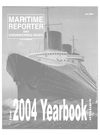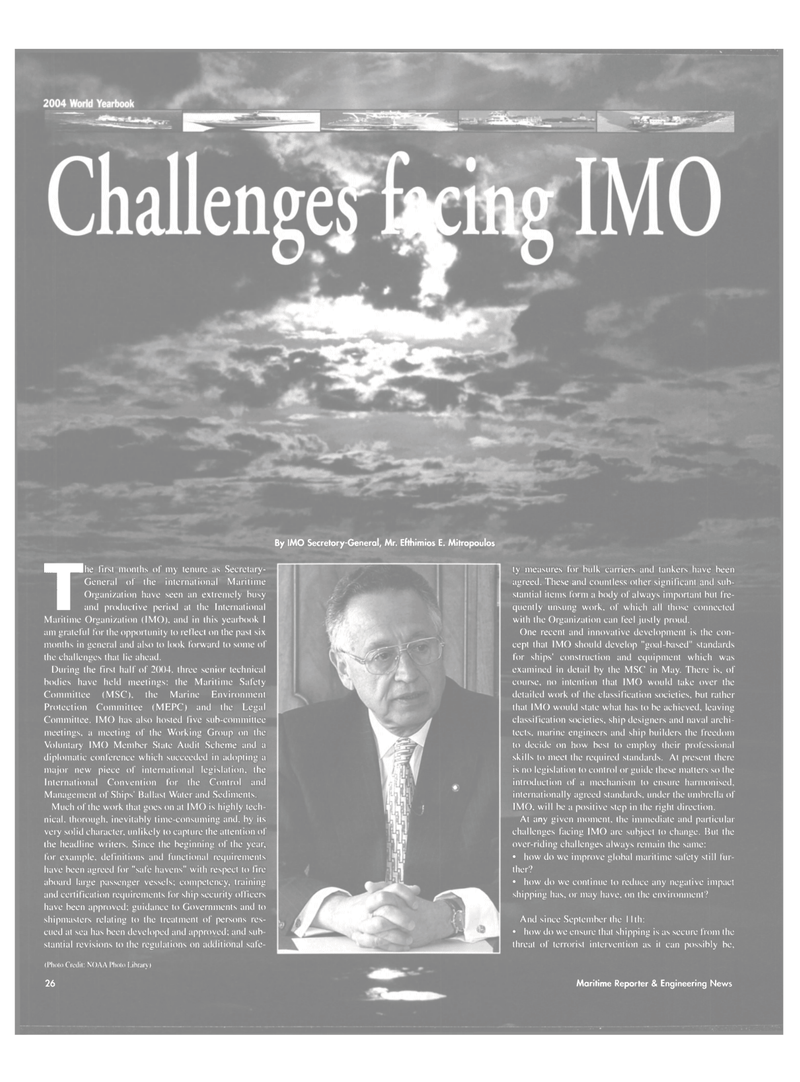
Page 26: of Maritime Reporter Magazine (June 2004)
Annual World Yearbook
Read this page in Pdf, Flash or Html5 edition of June 2004 Maritime Reporter Magazine
The first months of my tenure as Secretary-General of the international Maritime Organization have seen an extremely busy and productive period at the International
Maritime Organization (IMO). and in this yearbook I am grateful for the opportunity to reflect on the past six months in general and also to look forward to some of the challenges that lie ahead.
During the first half of 2004. three senior technical bodies have held meetings: the Maritime Safety
Committee (MSC). the Marine Environment
Protection Committee (MEPC) and the Legal
Committee. IMO has also hosted five sub-committee meetings, a meeting of the Working Group on the
Voluntary IMO Member State Audit Scheme and a diplomatic conference which succeeded in adopting a major new piece of international legislation, the
International Convention for the Control and
Management of Ships' Ballast Water and Sediments.
Much of the work that goes on at IMO is highly tech- nical. thorough, inevitably time-consuming and. by its very solid character, unlikely to capture the attention of the headline writers. Since the beginning of the year, for example, definitions and functional requirements have been agreed for "safe havens" with respect to fire aboard large passenger vessels; competency, training and certification requirements for ship security officers have been approved; guidance to Governments and to shipmasters relating to the treatment of persons res- cued at sea has been developed and approved; and sub- stantial revisions to the regulations on additional safe- (Photo Credit: NOAA Photo Library)
By IMO Secretory-General, Mr. Efthimios E. Mitropoulos ty measures for bulk carriers and tankers have been agreed. These and countless other significant and sub- stantial items form a body of always important but fre- quently unsung work, of which all those connected with the Organization can feel justly proud.
One recent and innovative development is the con- cept that IMO should develop "goal-based" standards for ships' construction and equipment which was examined in detail by the MSC in May. There is, of course, no intention that IMO would take over the detailed work of the classification societies, but rather that IMO would state what has to be achieved, leaving classification societies, ship designers and naval archi- tects, marine engineers and ship builders the freedom to decidc on how best to employ their professional skills to meet the required standards. At present there is no legislation lo control or guide these matters so the introduction of a mechanism to ensure harmonised, internationally agreed standards, under the umbrella of
IMO. will be a positive step in the right direction.
At any given moment, the immediate and particular challenges facing IMO are subject to change. But the over-riding challenges always remain the same: • how do we improve global maritime safety still fur- ther? • how do we continue to reduce any negative impact shipping has, or may have, on the environment?
And since September the I Ith: • how do we ensure that shipping is as secure from (he threat of terrorist intervention as il can possibly be. 26 Maritime Reporter & Engineering News

 25
25

 27
27
